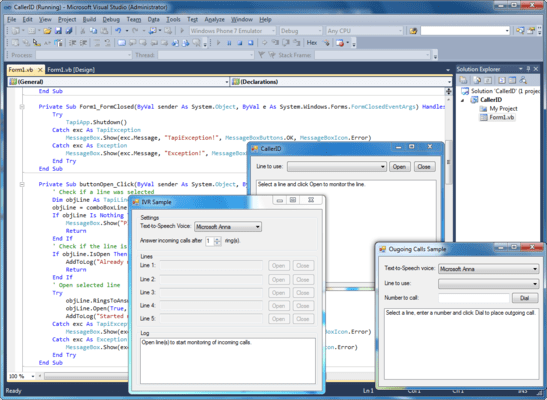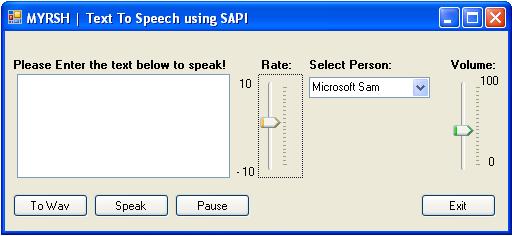Home > Articles > Programming > Windows Programming
␡- Example: A Spoken Hello, World Using the Microsoft Speech API
If the code example uses controls, use the Toolbox to add them to Form1. Double-click on Form1 to display the code. Select the example code from the documentation and copy (Ctl-C). Select all code in Form1 and paste (Ctl-V). Adding a reference to SAPI. From the Project menu, click References. In the References list box, select Microsoft Speech Object Library. About the Examples.

This chapter is from the book
This chapter is from the book

Example: A Spoken Hello, World Using the Microsoft Speech API
Once you've either referenced the Microsoft Speech Object Library in Visual Studio .NET, or run the TLBIMP.EXE utility on SAPI.DLL, you're ready to write the code that uses this COM component. This can be done with these two steps:

Type the following code either in a Visual Studio .NET project or in your favorite text editor.
It will activate new built of windows too. Crack examview trial windows 8.1 2017. KMSpico Activator is different from all of these and completely activate your windows 8.1. The solution for windows avtivation trouble is here and its 100% free free of cost & effective, you just have to download from the from and follow instructions.
Because Visual C++ .NET projects do not provide a mechanism for referencing COM components, TLBIMP.EXE needs to be used to create SpeechLib.dll regardless of whether or not you use Visual Studio .NET.
Compile and run the code (and listen to the voice). Feel free to have some more fun with the Speech API. You'll find that interacting with it is easy after you've gotten this far.
Notice the differences between the C#, Visual Basic .NET, and C++ versions of the same program. For example, the C# and C++ calls to Speak use two parameters but the same call in VB .NET has just one parameter. That's because the second parameter is optional, yet C# and C++ do not support optional parameters. Instead, a value must always be passed. Also notice that the C++ program instantiates SpVoiceClass instead of SpVoice as the others do. In this case, the C# and VB .NET compilers are doing some extra work behind-the-scenes to enable the user to work with a class that has the same name as the original COM coclass. More information about this extra work is given in the next chapter, 'An In-Depth Look at Imported Assemblies.'
Speech Spvoice
Related Resources
- Book $43.99
- Book $47.99
Using Sapi Visual Basic Programs Microsoft Word
- Book $47.99
Blog
- Eu4 Castilian Civil War
- Windows 7 Activation Failed
- Lycoming Service Instruction No. 1042
- Sketchup 2017 Crack Free Download 64 Bit
- Not Balok Lagu God Bless
- Download Game Resident Evil 5
- Marc Anthony Vivir Mi Vida Mp3 Download
- Chillara Gang Rap Mp3 Song Download
- How To Mod Diablo 3
- How To Download A Youtube Video
- Splash Screen Coreldraw 2018
- Java Smtpsendfailedexception: 552 5.3.4 Error: Message File Too Big
- Windows 10 Change To Administrator
- Hurth Hbw 150 A
- Civ 6 Custom Civs
- Kumpulan Tugas Akhir Teknik Sipil Word
- Call Of Duty World At War Wallpapers
- Live Like A Bisch
- Download Autocad 2d Full Crack
- Lovers Lab Sims 3